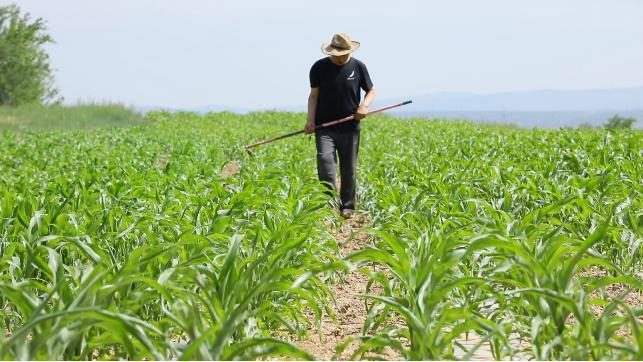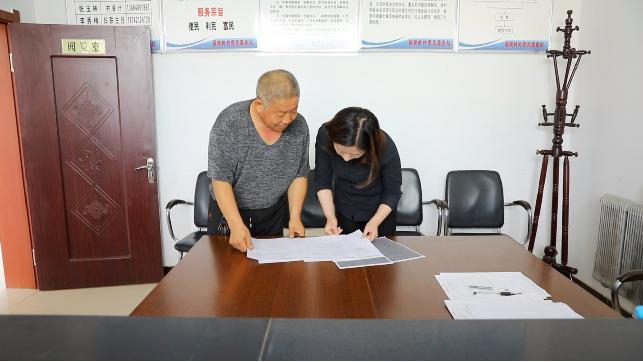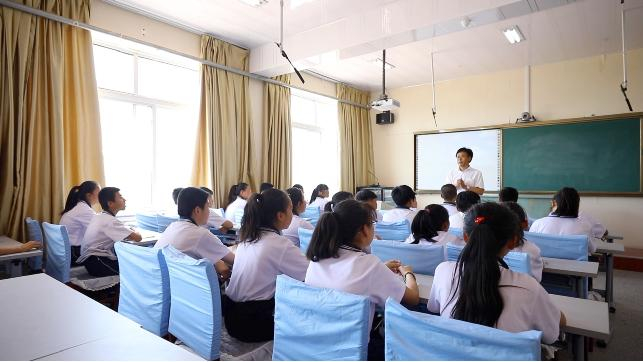

As the Chinese saying goes "when the grain is cheap, the farmers suffer." The fluctuation in the prices of crops has long been one of the main causes of rural poverty. This is the third consecutive year that China's No. 1 Central Document has called on the need to develop the use of futures, insurance and contract farming to prevent potential risks. Since then, Chinese financial markets have started pilot schemes to deal with the consequences of the difference in prices to help those in need.
In northeast China's Yangshuling Village, corn has long been the staple crop for hundreds of impoverished families living on the dry land. Falling prices in recent years have become a pitfall of a once stable source of income, especially after the country ended a nine-year corn price support program to reduce its huge stockpiles. In an unstable market, farmers have found a new way to cope.
Two village cooperatives signed agreements of over-the-counter (OTC) options for 10,000 tons of corn with a futures brokerage company and managed to get compensation of nearly 1 million yuan (146,000 U.S. dollars) as market prices fell below an agreed-upon amount when the period ended. Meanwhile, the company performed option replication in the futures market to hedge their own risks. It was the second, and largest, attempt in the region since 2017, when corn futures were introduced into targeted poverty alleviation.

A villager (L) shows the agreements signed between the cooperatives and the futures company to the CGTN reporter. /CGTN Photo
Villager Li Guangyou said the price of over 700 acres of corn their cooperative planted last year was much lower than expected. "Thanks to the deal with the futures company, we got subsidies and didn't lose money," said Li.
The local securities regulatory body, Liaoning Bureau of China Securities Regulatory Commission, has been striving to eliminate poverty by combining national policies with the capital market. Xia Ying, director of the bureau's institutional regulation department, said corn is the main income source of Yangshuling farmers while the trading of corn options has just been launched at the Dalian commodity exchange. "The pilot project shows how futures companies can serve social interests with the government," Xia added.
However, to further promote and commercialize the approach in guaranteeing the income of the impoverished grain producers, two major problems need to be solved: high premium costs and the low risk awareness. They require support from all parties to solve, including the local government, commodity exchanges, futures companies and leading enterprises in the sector.

Students in Yangshuling listen during a financial education class. /CGTN Photo
Xia said it's hard to let farmers invest in something high-risk without seeing a payback. In the case of Yangshuling, the futures company covered the 1 million yuan premium purely for public welfare. But the high costs for companies to hedge risks remains a big problem. "In the initial stage, commodity exchanges and futures companies have invested a lot of money. And, now we can see the local government that has gradually joined in," she added.
By the end of last year, one of the cooperatives in Yangshuling had successfully been lifted out of poverty. As a series of new attempts have been put into practice across the country, many believe it will also enable farmers to put more energy into production and entrust risk management to professional institutions.
Gao Zhijun, secretary of the village's Party committee, told CGTN that cooperatives used the compensation they got last year to develop a cooperative economy and standardized management, and most importantly, pay dividends to farmers. "It has greatly helped to wipe out poverty ... and we will consolidate this new mode with more funding and promotion," said Gao.
Besides, it's not just a matter of increasing earnings. Local officials say farmers are getting more aware of the significance of risk management and planting planning. They are now more willing to equip themselves and the next generation with financial knowledge. And that gain will lay a sound foundation for the future well-being of local people

Copyright © 2018 CGTN. Beijing ICP prepared NO.16065310-3
Copyright © 2018 CGTN. Beijing ICP prepared NO.16065310-3